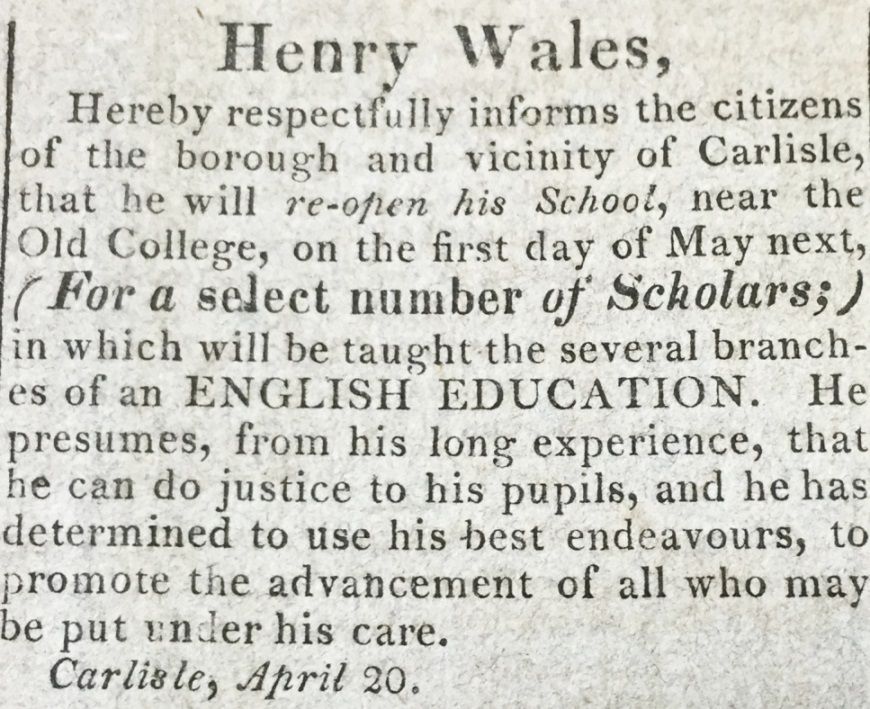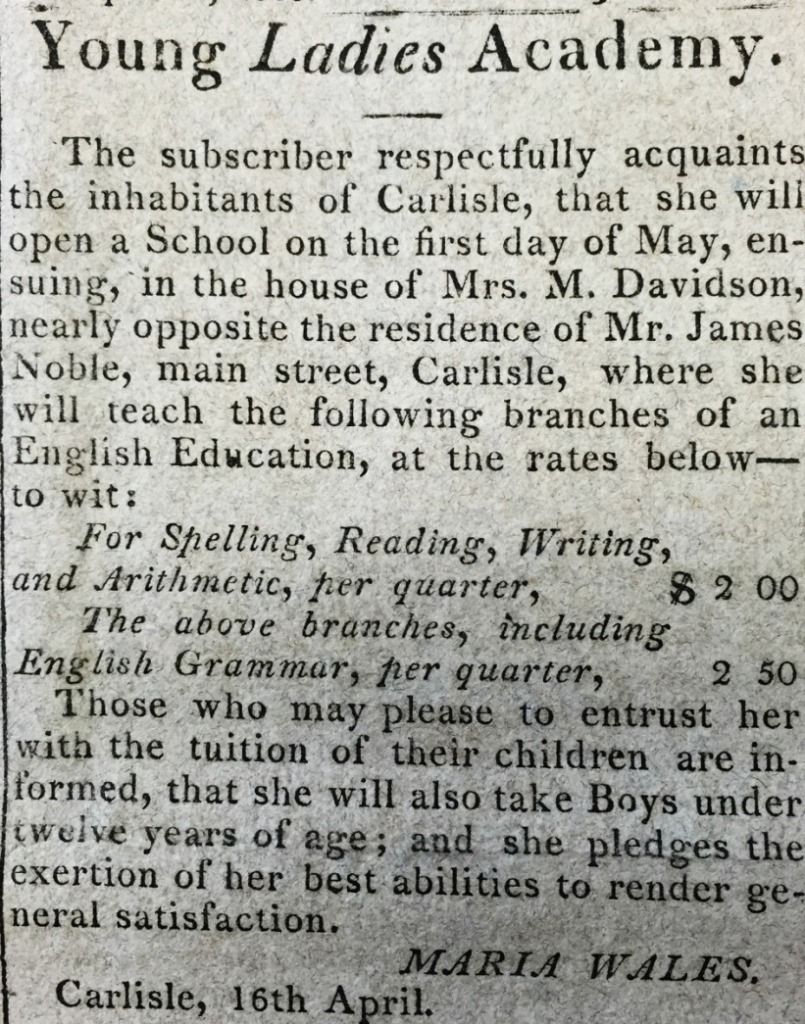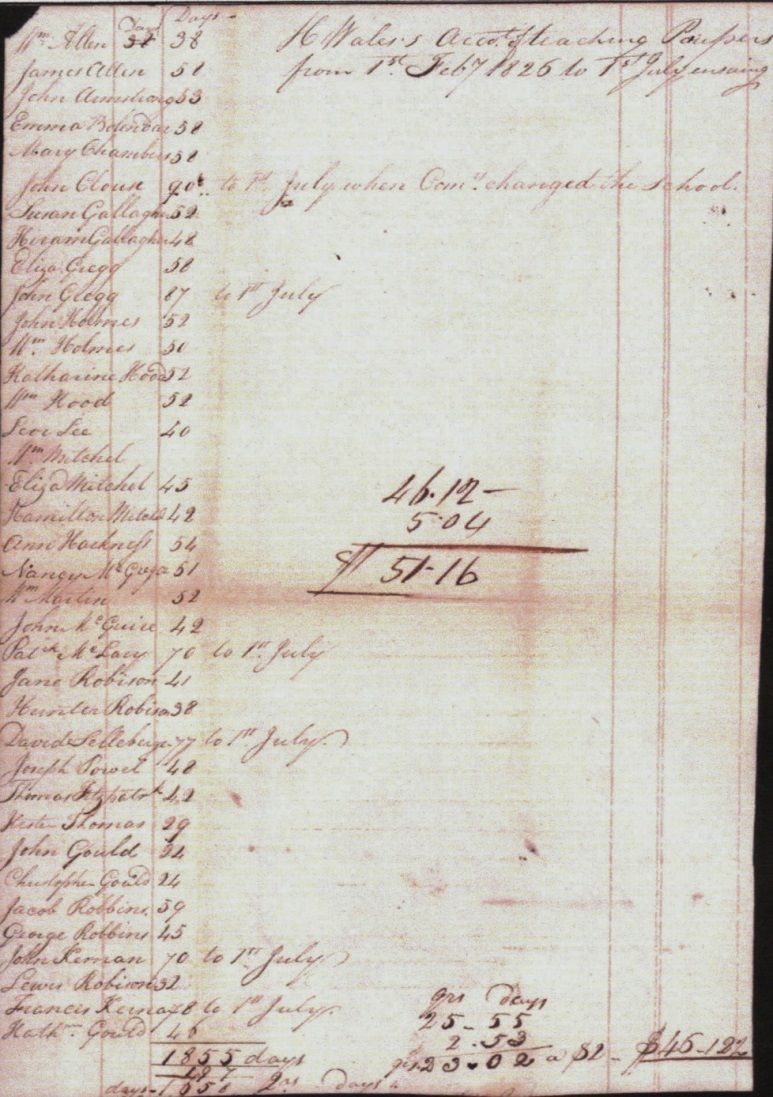A former resident wrote reminiscences of his school days in Carlisle in the 1820s and of his teacher Henry Wales. He sent them to the editor of the Carlisle Herald for publication.
“The first Yankee teacher of the English branches, whom I knew, was Henry Wales. He was a man of extraordinary energy and industry; and so popular for a while that he almost superseded the “masters” of the old school. The Lancastrian method of teaching was a favorite one with him. In fact, he made an experiment of it in Carlisle, in a modified form, to which the Town Council gave their encouragement by contributing a certain sum for the admission to the school of many of the poorest children of the town—one colored boy among the rest. The number of scholars at one time was nearly one hundred and fifty; and the way they all learned to move with precision and order, and to spell and write, and sing the arithmetical tables, making the walls of the Old College fairly vibrate with the sound, was a caution to young people...Another thing that I remember to his credit. Wales “knew a hawk from a hand saw,” which not every schoolmaster does nowadays, that is, he knew a good spelling book from an indifferent one. And so, as some of the new fangled teachers had laid aside Dilworth for Webster, he whistled Webster down the wind, and adopted Burran’s, [sic] which continued in use about as long as my school days lasted; and has now been replaced, in its turn, by newer and not better publications.”1
According to a history of Gettysburg Academy, Henry Wales was a New Englander who taught an English school at the Academy soon after it was established in 1810.2 After the death of his 20-year-old son, Horatio, in August 1819,3 Wales moved his family to Carlisle.4
Wales operated his school in Carlisle for paying scholars as well as for “paupers.” Before the establishment of the public school system, Pennsylvania counties paid for “pauper” children between the ages of 5 and 12 to be educated. The county paid teachers for the number of days each child was taught during a term and for school supplies. Teachers were required to submit attendance reports and invoices to the County Commissioners for payment. Henry Wales’ reports and invoices cover the years from 1820 through 1827.
In 1823, the Trustees of the Poor School reported to the November Court of Quarter Sessions that they had visited the school of Henry Wales from time to time and they were of the opinion that "he has done full justice to the pupils in providing them with stationary, books & other necessary materials, & paying to them every possible attention...Yet notwithstanding we regret that the children have not made that progress in their studies which might be expected owing perhaps to their irregular attendance at school....When we first visited the school the total amount of scholars on the list was 168, of which number eighty to one hundred duly attended. Since that time according to the account given us by the teacher, thirty two have removed from Town, nine were put out either hired or bound. Ten left school for some cause not known to us. Thirteen never came in & twelve became over age. Hence it appears that but ninety five of the whole number remain as attending scholars of which number from forty to fifty only attend regularly at this time." Signed Benjamin Kellar, Wm. Line, J. McGinnis, Jr.
In 1827, Wales was forced to petition for insolvency. His petition included a “Statement of Petitioners Losses and the means whereby he became insolvent.” Wales wrote that an “Increase of family expenses by sickness, loss of the poor school by Act of Assembly, and in endeavoring to continue on through the past year with a part of the Paupers, served to deprive me of a School sufficient for the maintenance of my family.”
His Insolvent Debtors Petition listed the names of each of his creditors and the amounts that he owed them, as well as a schedule of his property which included:
“2 bedsteads, 2 beds, 1 breakfast table, 1 large iron kettle, 10 chairs, 1 bake pan, 2 dinner pots, 1 tea kettle, 2 stoves, 1 small stand, 1 kitchen dresser, 2 shovels, 1 spaid [sic], 2 hay forks, 1 hoe, 1 grubbing hoe, 1 grubbing hoe, 1 wheelbarrow, 1 cow, 1 pair andirons, 1 pair andirons, shovel & tongs, 1 school bell, 1 looking glass, 1 hand saw, 1 small trunk books, 11 school desks, 1 meat tub, 1 water hogshead, 2 small tenements and lot of ground No. 259 in Pomfret St., Carlisle.”5
When Wales’ property on East Pomfret Street was sold by the sheriff on December 11, 1827, the family left Carlisle.6



